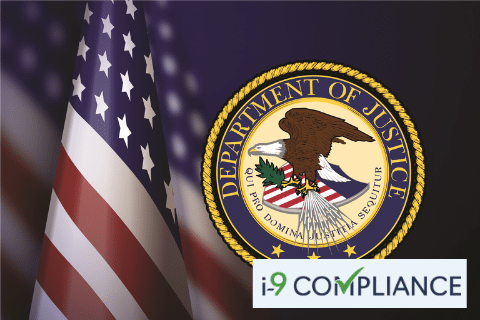The Justice Department Settles With Insurance Company Over Employment Eligibility Verification Violations

The Department of Justice recently came to a settlement with an insurance agency that has its headquarters located in Lynchburg, VA. The settlement resolved claims by the Justice Department that the insurance company had discriminated based on citizenship status against a non-citizen by asking him to provide a specific document to prove that he had permission to work in the United States. The insurance company rejected the document the worker had presented even though it was a valid document. Additionally, the Department of Justice found that the insurance company had regularly discriminated against applicants that were not U.S. citizens by refusing to consider or hire these applicants because of their citizenship status.
According to Assistant Attorney General Kristen Clarke of the Justice Department’s Civil Rights Division, “Employers cannot refuse to hire applicants based on their citizenship status except when they are authorized by law to do so.” Additionally, she stated that employers are not allowed to discriminate against workers while they are verifying their permission to work in the United States.
The Department of Justice found during its investigation of the insurance company that it had discriminated against a worker that was a lawful permanent resident when they asked the worker for a permanent resident card as a way of proving his permission to work in the U.S. They also rejected a valid form of documentation that he had provided. The Department also found that from approximately June 1st, 2017, until August 1st, 2020, the insurance company discriminated against non-United States citizens by not considering them for employment or hiring them for positions because of their citizenship status.
U.S. citizens, refugees, asylees, and recent lawful permanent residents, as well as non-U.S. citizen nationals, are protected from hiring discrimination that is based on the status of their citizenship by the anti-discrimination provision of the Immigration and Nationality Act (INA). However, there is an exception to the law that permits employers or recruiters to limit who they hire for a job based on citizenship status if they are required by law, executive order, government contract, or regulation to do so. Additionally, an employer is required to allow workers to provide any valid documentation they choose as proof of their permission to work in the United States and are not allowed to reject any valid documentation if that documentation appears to be genuine.
The settlement requires the insurance company to pay $9,500 in civil penalties to the United States as well as $70,000 in back pay to the workers who were affected by this discrimination. The company will also be required to train employees as to the requirements of the Immigration and Nationality Act’s anti-discrimination provision. It will also be subject to the Department’s reporting requirements and monitoring.
Employer Takeaways
As this case demonstrates, compliance with employment eligibility verification requirements can be complex and difficult for employers. One of the best ways to help is with an electronic I-9 management tool. This can guide you through every step of the process and ensure that documents are stored properly.
Interested in automating your employment eligibility verification? Ensure compliance today with I-9 Compliance.